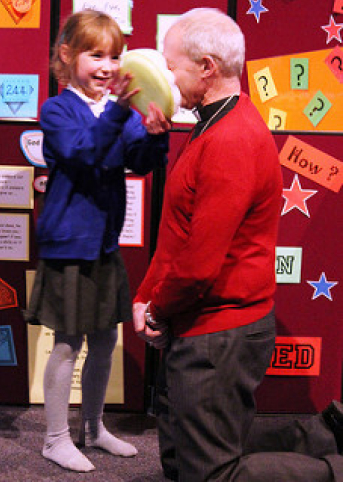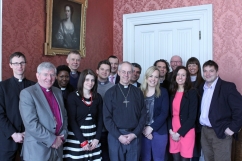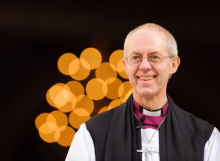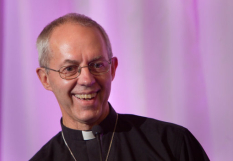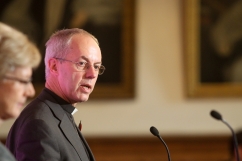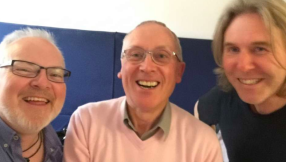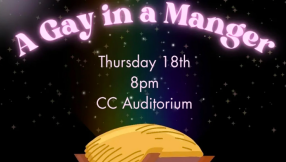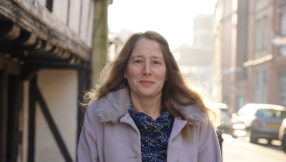About 25 schoolchildren are shrieking with delight as the Most Rev and Rt Hon Justin Welby, the 105th archbishop of Canterbury, the primate of all England, attempts to escape from a small child brandishing a custard pie.
It's a slightly incongruous sight to me, but the Archbishop seems unperturbed.
"I've had much worse than that before," he chuckles to his press officer as he towels himself off after his eventual capture. "I've been gunged... this was fine, more like foam."
It is just over three years since he was installed as Archbishop, after an unexpected rise through the ranks of Church of England hierarchy (he was bishop of Durham for just over a year).
In his in-tray in the last three years has been women bishops, church decline, terrorist attacks, abuse scandals and the unenviable task of trying to hold the Anglican Communion together when divisions over sexuality threaten to turn cracks into craters.
So he'd be forgiven for not making much progress with the priorities he laid out for himself at the start of his tenure – namely, evangelism, reconciliation and prayer. It could have become a prolonged case of the urgent crowding out the important.
Welby is from the Holy Trinity Brompton stable – this was the church he attended when he was still working in the oil industry, before his call to ordination – so it isn't really a surprise that he's an evangelism enthusiast. Perhaps more surprising is that he's getting anywhere with it.
We live in a time of general mistrust towards religion, fueled partly by the terrible acts of violence perpetrated in God's name. Relativism – the idea that 'your truth is fine for you, but I'll follow mine' – is the god of the age. Then there's the Church of England itself, which in the public consciousness goes from being quaint, likeable perhaps but largely irrelevant, to a more ominous home of abuse cover-ups and homophobia.
All that against a pervasive attitude within the Church of England that evangelism isn't really necessary, or that a simple hatch-match-and-dispatch approach was all that was needed, and you've got a job on your hands.
Justin Welby is well aware of this. He quipped in a lecture at Lambeth Palace last year: "When I introduced my third priority as Evangelism and Witness I imagine some, maybe a minority, were high-fiving, while others stopped and stared into space with a look of horror, thinking, 'Here we go again'."
And yet, in spite of everything, something seems to be happening. People within the Church of England describe a sea-change, an awakening, a new enthusiasm for evangelism.
This is in no small part due to a realisation that unless something is done, the Church of England is going to fall off a cliff, numbers-wise. But everyone I speak to about it puts it down, to a greater or a lesser extent, to the leadership of Justin Welby and John Sentamu.
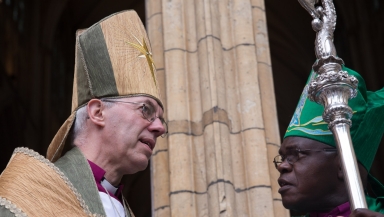
What does Welby himself think is behind it?
"I think it's a lot of things," he says. "There are good reasons and bad reasons. I think in some ways people recognise that decline in church numbers is a serious issue. But that's the bad reason, because you don't evangelise to ensure the survival of the church."
There is something inescapably stern and schoolmasterly about Welby. There is a reaction I can't quite pinpoint – somewhere between irritation and amusement – when I ask for his views on salvation, for example. Yes, it's serious matter, but it's also a bit of a waste of time discussing it.
"My view of salvation is found in John 3:16. [For God so loved the world that he gave his one and only Son, that whoever believes in him shall not perish but have eternal life.]
"We can argue about eternal conscious punishment or annihilation until the cows come home. What matters is that God has taken all the steps necessary for human beings to have a relationship with God and the good news of the gospel is that. And if people turn that down, obviously in some way that I don't claim I fully understand,that is going to be a very serious matter indeed, the most serious that any human being could ever have.
"But who is saved, and who is not saved, is in the judgment of God and it is not in my judgment. And so who God saves is God's question."
He is also a pragmatist. While he thinks deeply and gives considered answers to questions about the complex problems facing the church, evangelism itself is very straightforward. There is a great confidence and enthusiasm as he describes churches he has visited – churches where lots of older people are becoming Christians, churches running foodbanks and doing community outreach... Do we need strategies and systems and initiatives to see this sort of thing happen? No. We need to pray, we need to trust God and we need to jolly well get on with it.
"I think we do what we've always done at our best, which is we draw closer to God, we serve the communities in which we live and seek to bless them more faithfully and in our outreach and our witness and our evangelism we avoid all manipulation and all trickery and we simply present the reality of the goodness of Jesus Christ through our actions and our words," he says.
"There isn't a big magic button you can press, or magic wand you can wave, which suddenly says well if you do the following six things in this order, the church's reputation will suddenly be changed.
"We're called to be holy, we're called to be suffering, we're called to be serving and loving. There's nothing big, you know, big and new about that. What's big and new is when any church does it – and they do from time to time, and when they do, people really see it, and even if they don't agree, they're struck by it."
But what about some of the bigger religious questions that are being posed in the world right now? We are speaking the day after the Brussels attacks, at a time of heightened hostility towards Muslims. #StopIslam was trending on Twitter as we spoke. Is this our problem? Yes. Welby thinks we have a responsibility to "demonstrate hospitality for mainstream Muslim leaders who themselves have taken huge risks and are suffering very significant threats when they stand up against attacks like Brussels.
"Secondly, I think we have a responsibility to be part of the process of developing a narrative that is more attractive within our society than the perverted, cruel and savage narrative which takes young men in particular, but women as well, into extremist action.
"Hostility to all Muslims because they're Muslims – although we disagree as Christians with their theology – is a deeply unChristian and wrong way of behaving."
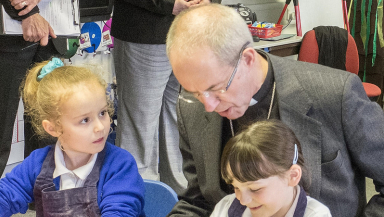
Does he think it makes the case for faith harder?
"Yes, I do. For people who are of no faith, this merely seems to confirm the false idea that all faiths lead to war. Actually war and violence, domination, savagery, cruelty, are inherent in the character of a human being, they are part of fallen humanity, they're part of our sinfulness and they're common to every human being.
"What Jesus does is change and transform that when we are following him faithfully."
He acknowledges too the lack of trust in organised religion, the reasons for which go far beyond terrorism.
"Oh yes. I think we're living in an era – well, as we know it's a cliché to say we're in an era where all institutions are mistrusted. We know that.
"But organised religion, because there is a history within organised religion of patriarchy, of cruelty, of the abuse and misuse of power, and we have to live with the inheritance of that, and counter it by the way we behave and act today...We need to be churches who wash each other's feet... We have to keep doing that because the default reaction of human beings is always towards power and oppression."
There's a widespread perception outside the church that its official attitude toward homosexuality is a manifestation of just this bias to oppression. Outside religious circles it is almost inconceivable that you could have a moral objection to someone having a monogamous relationship with someone of the same sex. The issue is inescapable for senior Anglican leaders and it undoubtedly makes evangelism more difficult. So how does the church make a case for the traditional understanding of sexuality, and at the same time convince non-Christians that it is not homophobic? Is it possible to reconcile the two?
"If there was a simple answer to that question someone would have found it who's much cleverer than me."
Welby's approach is first to talk about homophobia, to acknowledge its existence within the church. "Of course there are parts of the church that have been historically and still are homophobic and that is deeply and profoundly wrong, and the church needs to demonstrate its sorrow over that.
"I loathe and hate homophobia. I find it incomprehensible that people should feel that way about LGBTI people. And I'm always ashamed when I find it."
He points out that the single biggest cause of self-harming and even possibly of suicide for young people, is their own sexuality. But there are other parts of the Anglican Communion where conversations about homosexuality are far more difficult. In Uganda, a fiercely conservative country, parliament passed a bill in 2013 – since declared invalid on constitutional grounds – mandating life imprisonment for homosexual 'offences'. In a previous version it was the death penalty. The Archbishop of Uganda was the only one to walk out of January's Primates Meeting in protest at its handling of the US Episcopal Church's acceptance of same-sex relationships.
Nevertheless Welby is encouraged by the 'Shared Conversations' which are taking place within the Church of England, in which groups of 50-60 people – some who are LGBTI affirming and others who, on principle, are not – meet to discuss and listen to each other's views.
"The aim of them is not, as it were, to convert the other, but to enable each to listen and see the others as a human being and as a fellow Christian.
"The impact of that has been really significant among those taking part – not everyone obviously. But there's been a real change and I think the shared conversations themselves, saying to people you must listen to people you disagree with on sexuality with respect, with love, is already a step away from the homophobia, it's an action. It's not merely a process towards an action, it's an action in and of itself."
He won't commit himself to where he thinks those conversations are going to go.
"I know it's got to end with a place that any reasonable person looking at what we're saying and doing could say, 'This is not homophobia, but it has integrity' even if they disagree with it. I'm not saying at the moment in any way what I think, because I don't want to prejudge what happens in the synod and so on, and I'll say what I think in due course."
For all the challenges the Church of England faces, regarding evangelism and everything else which goes alongside it, there is a touching lightness to the way Welby approaches things.
When I ask what he seems to regard as an extraordinarily stupid question about putting more resources into youth and children's work "because that's when everyone becomes Christians", the serious mask comes off and he starts to enjoy himself enormously.
"Well that's rubbish for starters... I've seen a number of people in the last 12 months, much later in life, become Christians. It's a myth.... If we say that that is definitive, where's God in that? This is ridiculous! Of course the majority of people become Christians earlier in life, but an awful lot of people don't, and there is no reason in God's economy why it is only early in life."
It's surprising how revelatory his reaction to my verbal misstep becomes. He's having fun, but he's deadly serious too. And what shines through is – in a good way – the scale of his ambition.
"The majority of people who become Christians at the moment become Christians when they're young, but are we satisfied with that? Do we think that's the right answer? Was St Paul a child on the road to Damascus? Were any of the apostles? Did Jesus say 'I'm not going to bother calling Peter, he's a grown up?'
"Are we really saying that we want to abandon all the buildings that can hold hundreds of people because we don't believe God's up to bringing a revival?"
He pauses from his laughing tirade for a quick breath.
"Oh give over. You know, you of little faith!"

